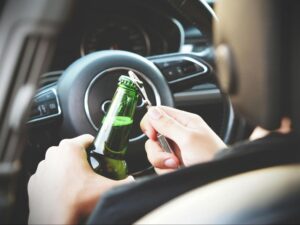
If you find yourself in this situation, wondering, “a drunk driver hit my parked car what now?”, it’s important to know how to take control. You can confidently navigate the aftermath by understanding the necessary steps to protect your rights, handling insurance, and seeking the compensation you deserve.
This article provides comprehensive insights into this unfortunate scenario, ensuring that you are well-prepared if such an event occurs.
Understanding the Legal Implications
When a drunk driver hits your parked car, the situation can bring several legal complications. Understanding these implications is vital to ensuring that your rights are protected and that you can seek the compensation you deserve.
At Howe Law, we specialize in helping victims of accidents like this secure the compensation they need. Reach out today for a consultation, and let us help you through every step of the process.
Drunk Driving Laws and Penalties
Drunk driving laws vary by state, but typically, driving under the influence (DUI) is considered a serious offense. Penalties for DUI may include fines, license suspension, and even imprisonment.
Furthermore, if a driver is found to be intoxicated while causing damage to your parked vehicle, they may face additional civil liabilities.
Key points regarding drunk driving laws include:
- Legal blood alcohol concentration (BAC) limits
- Zero tolerance laws for underage drivers
- The impact of prior DUI offenses on penalties
In addition to these legal ramifications, the consequences of a DUI conviction can extend beyond immediate penalties. For instance, a DUI can significantly affect a person’s insurance rates, often leading to higher premiums or even the inability to obtain coverage.
Moreover, the stigma associated with a DUI can have social and professional repercussions, impacting employment opportunities and personal relationships.
Liability in Drunk Driving Accidents

In most cases, the intoxicated driver is held liable for the damages caused. However, liability can also involve other parties. For instance, if the driver was served alcohol at a bar or restaurant before the incident, that establishment could potentially face liability under dram shop laws.
Understanding liability in these accidents can help determine who you may pursue for compensation. Factors to consider include:
- The actions of the intoxicated driver
- Potential contributory negligence
- Involvement of third parties
Additionally, it’s essential to gather evidence promptly after the accident. This may include photographing the scene, collecting witness statements, and obtaining a copy of the police report.
Such documentation can be crucial in establishing liability and supporting your case for compensation.
Furthermore, consulting with a legal professional who specializes in personal injury or DUI cases can provide invaluable guidance on navigating the complexities of the legal system and ensuring that all responsible parties are held accountable.
Steps to Take Immediately After the Incident
What you do immediately after your parked car is hit is crucial in protecting your rights and facilitating the claims process. Taking organized, prompt action can significantly affect the outcome of your situation.
Gathering Necessary Information
Start by collecting all relevant information. Documenting what happened will be vital for any future legal proceedings or insurance claims. Consider the following:
- Driver’s name and contact information
- Insurance details of the at-fault driver
- Witness information, if available
- Photos of the damage and the accident scene
This information will help establish liability and assist in the insurance claim process. Additionally, it’s wise to note the other vehicle’s make, model, and license plate number.
This can be beneficial if the driver fails to provide accurate information or if they leave the scene before you can gather all necessary details.
The more comprehensive your documentation, the stronger your position will be when dealing with insurance companies or legal representatives.
Reporting to the Police
It is typically advisable to file a police report after an accident. Contact local law enforcement and provide them with details of the incident.
A police report can serve as an official document that outlines the circumstances of the accident, which may be crucial for your insurance claim.
When filing the report, emphasize the following points:
- The circumstances of the incident
- Details about the drunk driver’s behavior
- Any injuries sustained (if applicable)
In addition to these points, you should request a copy of the police report for your records. Although this document may take some time to process, it will be an essential piece of evidence.
Moreover, if the police issue any citations or make arrests, this information will also be included in the report, further supporting your case.
Remember, the police may not always arrive at the scene, especially in minor accidents, so knowing how to file a report on your own is equally important. You can often do this online or by visiting your local police station, ensuring that your account of the incident is officially recorded.
Dealing with Insurance Companies
Navigating the insurance claims process after a drunk driving incident can be complex. A thorough understanding of how to deal with insurance companies can help you achieve a fair settlement.
Filing a Claim
Once you have gathered all the necessary information and obtained the police report, you can begin the process of filing a claim with the at-fault driver’s insurance company. Be sure to include all relevant documents to support your claim, including:
- The police report
- Your vehicle’s repair estimates
- Medical records, if applicable
Keep records of all communications with the insurance company, as this will be helpful if disputes arise. It’s also advisable to document the timeline of events, including when the accident occurred, when you filed the claim, and any follow-up actions taken.
This detailed account can serve as a valuable reference if you need to escalate the claim or seek legal advice. Additionally, consider photographing the accident scene and your vehicle’s damage, as visual evidence can significantly bolster your case.
Negotiating a Settlement
After filing your claim, be prepared to negotiate. Insurance companies may initially offer a lower amount than what you deserve. It’s essential to understand your rights and the actual damages incurred. Factors influencing your settlement offer can include:
- The extent of damage to your vehicle
- The impact on your personal life or work
- The pain and suffering experienced
Consider seeking professional assistance from an experienced claims adjuster or attorney to ensure you receive fair compensation.
A skilled negotiator can provide insights into the typical settlement amounts for similar cases, helping you establish a solid foundation for your counteroffer.
Furthermore, they can assist in articulating the emotional and financial toll the accident has taken on your life, which is often a critical component in achieving a satisfactory settlement.
Remember, the negotiation process can be lengthy, and patience is key; staying organized and persistent can ultimately lead to a more favorable outcome.
Seeking Legal Help

When a drunk driver damages your parked car, it may become necessary to seek legal assistance. A personal injury attorney can provide knowledgeable representation and guide you through the complexities of the legal system.
They offer insights into your rights and help you understand the potential outcomes based on the specifics of your case. Engaging a lawyer can alleviate some of the stress associated with the aftermath of an accident, allowing you to focus on recovery and getting your life back on track.
When to Hire a Lawyer
While not all cases require legal representation, certain circumstances warrant bringing in a lawyer. Consider hiring legal help if:
- The insurance company refuses to cooperate
- You’re facing significant property damage or personal injury
- There are disputes regarding liability or damages
Legal professionals can navigate the situation expertly, ensuring your interests are adequately represented. They can also provide a realistic assessment of your case, helping you understand the potential for compensation based on the facts and evidence available.
Additionally, a skilled attorney can negotiate with insurance companies on your behalf, which often leads to a more favorable settlement than you might achieve on your own.
Preparing for a Lawsuit
If necessary, preparing for a lawsuit will require meticulous organization. Your attorney will guide you in gathering evidence and witness statements. Important steps include:
- Documenting all relevant events and interactions
- Expert assessments of damage and liability
- Preparing for mediation or court if negotiations fail
Understanding the lawsuit process and having a prepared legal strategy is essential to effectively pursuing your claim.
This preparation may also involve consulting with accident reconstruction experts or medical professionals who can provide testimony regarding the extent of your injuries.
Furthermore, your attorney will help you understand the legal process’s timeline, including filing deadlines and the potential duration of litigation. This can help you manage your expectations and plan accordingly.
Emotional and Psychological Impact
Experiencing an accident involving a drunk driver can also have emotional and psychological ramifications. Addressing these impacts is equally important as tackling the legal and insurance aspects.
Dealing with Stress and Anxiety
It is common to feel stress or anxiety after such an incident. The uncertainty surrounding your vehicle, possible injuries, and legal matters might overwhelm you. Techniques to manage stress include:
- Practicing mindfulness and relaxation exercises
- Engaging in physical activities or hobbies
- Creating a support network of friends and family
Recognizing these feelings and taking proactive steps can help you cope more effectively. Additionally, journaling can serve as a therapeutic outlet, allowing you to articulate your thoughts and emotions, providing clarity and relief.
Many individuals find that expressing their feelings on paper helps to externalize their worries, making them feel more manageable. Furthermore, maintaining a routine can instill a sense of normalcy and control amidst the chaos, helping to alleviate some of the anxiety associated with the aftermath of the accident.
Seeking Support and Counseling
If feelings of anxiety persist, seeking professional support might be beneficial. Counseling can provide an effective outlet for processing your emotions and developing coping strategies.
Support groups and therapy sessions offer spaces for sharing experiences and learning from others in similar situations.
Determining the right type of professional help depends on individual needs, but even small steps toward emotional wellness can make a significant difference. Healing is a personal journey, and there is no one-size-fits-all approach.
Some may benefit from cognitive-behavioral therapy, which focuses on changing negative thought patterns, while others might find solace in group therapy settings where they can connect with peers who understand their struggles.
Moreover, holistic approaches, such as art therapy or yoga, can also be effective in promoting emotional healing and resilience, allowing individuals to explore their feelings in a creative and supportive environment.
Conclusion
In summary, if a drunk driver hits your parked car, it’s crucial to understand the legal implications, take immediate action, deal effectively with insurance companies, and consider seeking legal help if necessary.
Additionally, addressing the emotional and psychological impact of the incident is vital for recovery. Following the steps outlined in this article, you can navigate this challenging situation more confidently and clearly.
For expert guidance during this challenging time, reach out to Howe Law for a free consultation. Call 888-559-7612—we’re available 24 hours a day, 7 days a week. Your recovery and peace of mind are our priorities.
Related Articles


























































